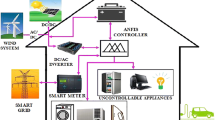Abstract
Energy management plays a vital role in maintaining sustainability and reliability of smart grid. It also helps to prevent blackouts. Energy management at consumers side is a complex task. Utility provides incentives like: demand response, time of use and real time pricing models to encourage consumers to reduce electricity consumption in certain periods of time. However, changing energy consumption pattern according to these incentives becomes difficult for consumers. In this paper, we have proposed a fuzzy logic based energy management controller (EMC) for illumination system management. We have used fuzzy logic for reduction of monetary cost and energy consumption. This fuzzy based controller is fully automatic and alters illumination levels between comfort zone of a consumer. It alters illumination level according to price and other input parameters.
Access this chapter
Tax calculation will be finalised at checkout
Purchases are for personal use only
Similar content being viewed by others
References
Mary, G.A., Rajarajeswari, R.: Smart grid cost optimization using genetic algorithm. Int. J. Res. Eng. Technol. 3(07), 282–287 (2014)
Vardakas, J.S., Zorba, N., Verikoukis, C.V.: A survey on demand response programs in smart grids: pricing methods and optimization algorithms. IEEE Commun. Surv. Tutorials 17(1), 152–178 (2015)
Logenthiran, T., Srinivasan, D., Shun, T.Z.: Demand side management in smart grid using heuristic optimization. IEEE Trans. Smart Grid 3(3), 1244–1252 (2012)
Ahmad, A., Javaid, N., Alrajeh, N., Khan, Z.A., Qasim, U., Khan, A.: A modified feature selection and artificial neural network-based day-ahead load forecasting model for a smart grid. Appl. Sci. 5(4), 1756–1772 (2015)
Mehrshad, M., Tafti, A.D., Effatnejad, R.: Demand-side management in the smart grid based on energy consumption scheduling by NSGA-II. Int. J. Eng. Pract. Res. (2013)
Rahim, S., Javaid, N., Ahmad, A., Khan, S.A., Khan, Z.A., Alrajeh, N., Qasim, U.: Exploiting heuristic algorithms to efficiently utilize energy management controllers with renewable energy sources. Energy Build. 129, 452–470 (2016)
Muralitharan, K., Sakthivel, R., Shi, Y.: Multiobjective optimization technique for demand side management with load balancing approach in smart grid. Neurocomputing 177, 110–119 (2016)
Liu, J., Zhang, W., Chu, X., Liu, Y.: Fuzzy logic controller for energy savings in a smart LED lighting system considering lighting comfort and daylight. Energy Build. 127, 95–104 (2016)
http://www.engineeringtoolbox.com/light-level-rooms-d708.html. Accessed 27 Mar 2017
Rastegar, M., Fotuhi-Firuzabad, M., Zareipour, H.: Home energy management incorporating operational priority of appliances. Int. J. Electr. Power Energy Syst. 74, 286–292 (2016)
Perez, K.X., Baldea, M., Edgar, T.F.: Integrated HVAC management and optimal scheduling of smart appliances for community peak load reduction. Energy Build. 123, 34–40 (2016)
Keshtkar, A., Arzanpour, S.: An adaptive fuzzy logic system for residential energy management in smart grid environments. Appl. Energy 186, 68–81 (2017)
Chew, I., Kalavally, V., Oo, N.W., Parkkinen, J.: Design of an energysaving controller for an intelligent LED lighting system. Energy Build. 120, 1–9 (2016)
Keshtkar, A., Arzanpour, S., Keshtkar, F., Ahmadi, P.: Smart residential load reduction via fuzzy logic, wireless sensors, and smart grid incentives. Energy Build. 104, 165–180 (2015)
Author information
Authors and Affiliations
Corresponding author
Editor information
Editors and Affiliations
Rights and permissions
Copyright information
© 2018 Springer International Publishing AG
About this paper
Cite this paper
Khalid, R. et al. (2018). Fuzzy Energy Management Controller for Smart Homes. In: Barolli, L., Enokido, T. (eds) Innovative Mobile and Internet Services in Ubiquitous Computing . IMIS 2017. Advances in Intelligent Systems and Computing, vol 612. Springer, Cham. https://doi.org/10.1007/978-3-319-61542-4_19
Download citation
DOI: https://doi.org/10.1007/978-3-319-61542-4_19
Published:
Publisher Name: Springer, Cham
Print ISBN: 978-3-319-61541-7
Online ISBN: 978-3-319-61542-4
eBook Packages: EngineeringEngineering (R0)




